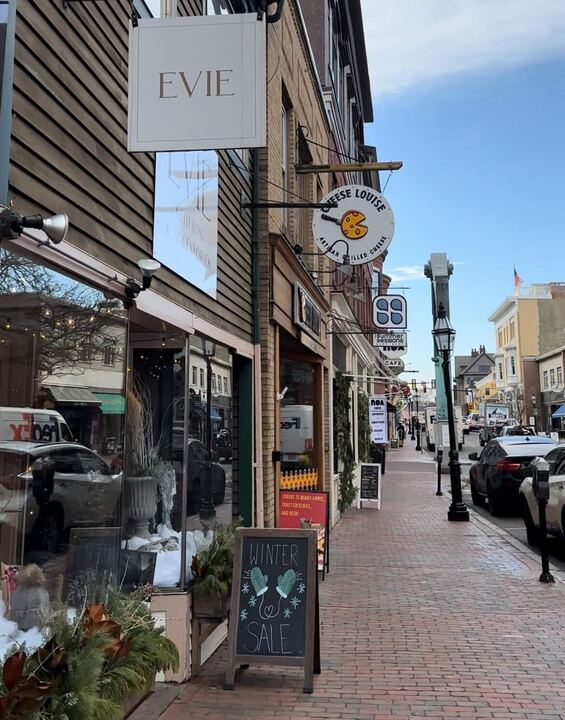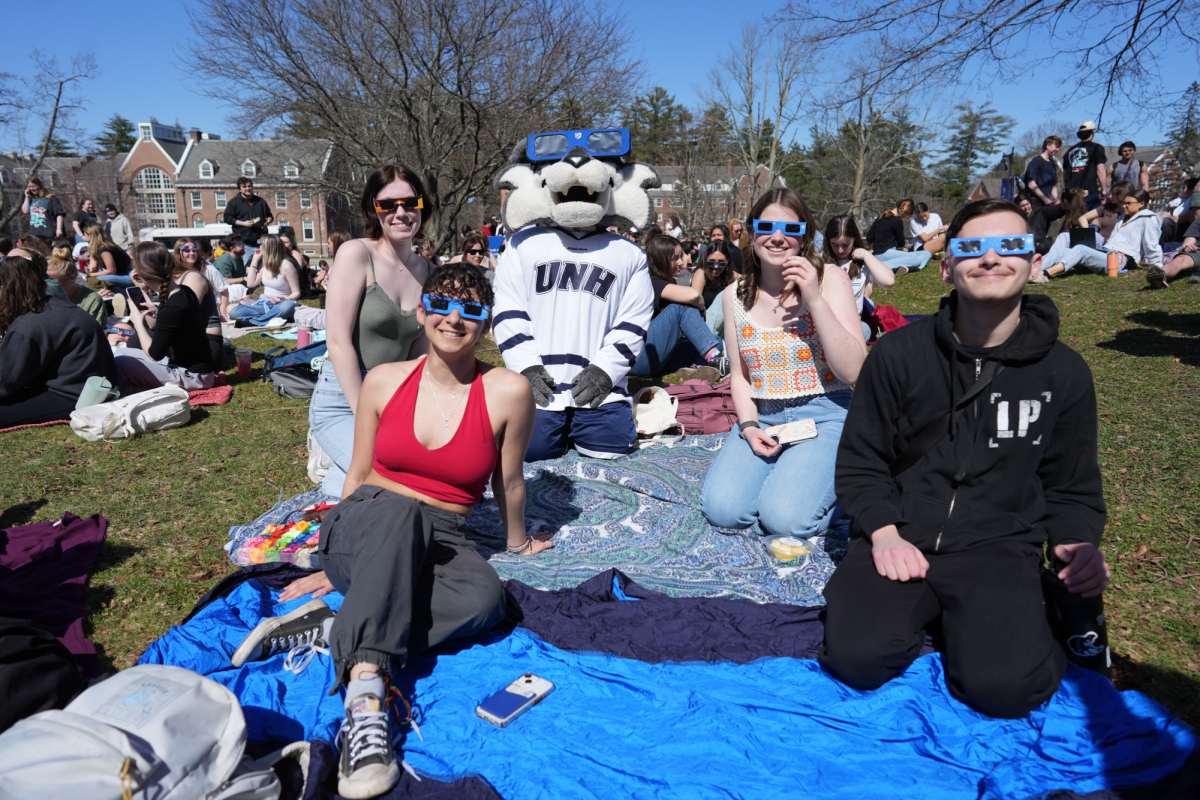With the explicit goal of spreading awareness of “liberal privilege” on modern college campuses, political group Turning Point USA at the University of New Hampshire (UNH) hosted the “Liberal Privilege Tour” in the MUB Theater 2 starring Cabot Phillips, the media director at online media outlet Campus Reform.
The April 23 event marked Phillips’ first time speaking at UNH and the final stop on the nationwide tour, which featured stops at many universities across the country, where he discussed the notion that “liberal” students that lean toward Democrat-favored views are granted “privileges” that “conservative” students are denied.
Campus Reform, according to Phillips, is an online publication hosted by the Leadership Institute covering college news that attempts to “expose the overwhelming bias that goes on college campuses” as well as the “systemic oppression of conservative voices” and “different measures…to take away free speech from students.” He told the audience that he has been covering the topic for the last three years and he has seen instances of “liberal privilege” on “hundreds of different campuses” after talking to “thousands of different students.”
“…I think we should all agree that it’s a bad thing on any college campus when people have their free speech rights taken away from them…[I’ve] seen this mindset growing where the First Amendment is under attack, and it’s no longer just taken for granted that people are willing to have free speech and allow others to have their free speech,” he said. “That’s something that really is under attack and I think it’s important for us to shine a light on that.”
Phillips called the university in general a “marketplace of ideas,” one home to a variety of viewpoints, theologies, and personal experiences from which students can form their own perspectives on issues and the world. Despite stating that Campus Reform has put “a lot of time and effort” into studying patterns of political bias on college campuses, he stressed that his examples of “privileges” in his presentation were intentionally broad and did not fully reflect UNH itself, but rather represent instances where university policy in general has reportedly expressed favoritism toward liberal students to the detriment of conservative ones.
In the core segment of his talk, Phillips said that “liberal privilege” starts with the concept of identity politics, where, per the speaker, a “push from the far-left” forces students to make decisions and possess certain mindsets based on their race, sex, gender, religion and other personal factors, resulting in a “hierarchy of oppression,” – quoting conservative Ben Shapiro – a system he criticized for, in his mind, allowing students to solve their problems and deal with potential oppressors in their eyes is to “complain” about the problem instead of taking direct action.
“…I think we see it going on, especially in academia, where you have this mindset of telling people, ‘we’re going to reward you based on the things that you can claim oppression from or oppression to.’ And there are, of course…real things that are oppressive in society and there are going to be real struggles that many people face, but…I think you give it power when you tell them to let it rule you, I think you give it power when you tell someone, ‘if you’re not making [where you want to be] in life [sic], it’s probably because you don’t check as many privilege boxes as someone that is successful,’” he said. “And I think when you tell people who are successful, ‘you’re getting there because of the privilege you have,’ you’re getting there not because of your hard work but in spite of it, and I think that’s not [an] empower[ing] message…”
Phillips stressed that, although efforts to fight “white privilege,” “male privilege” and “straight privilege” have good intentions, it fails to stem others from claiming privileges of their own, especially “privileges” that seemingly benefit the political left on college campuses, which he called the “most real and most present privilege enjoyed by people especially on college campuses in America.”
“I think liberal privilege essentially means that if you are on the political left, you’re going to have an easier go of it, you’re not going to face the same struggles and same pitfalls that your conservative counterparts face,” he stated as his definition of the term.
The speaker said “liberal privilege” “manifests” in three main places: academia, the media, and social media.
In the first category, Phillips said that in academia, one does not have to “come out” as a liberal due to stronger acceptance of liberals by students and faculty than conservatives on campuses and where there are social “ramifications” for revealing oneself to be conservative, and where professors would structure their readings and discussions around popular liberal perspectives. He pointed to a study conducted by social psychologist Jonathan Haidt that reportedly found that, for every one self-proclaimed conservative or libertarian professor, there were 12 self-identified liberal professors.
Phillips added that there were few notable instances of conservatives protesting liberal speakers, the opposite to liberal groups protesting conservative speakers, such as the occurrences at last year’s Turning Point USA event at the Whittemore Center featuring Dave Rubin. He claimed universities are using “speaker fees” worth thousands of dollars against “controversial” conservative speakers as a means to make it harder for them to present their views on campuses while rewarding protestors threatening such events.
In the second category, Phillips explained that “[l]iberal privilege in the media means that you have the privilege of knowing that your ideas are going to be held up and propped up in the mainstream media as a whole. It means that whenever someone hears a conservative idea, it’s usually being told with a skew and that…ultimately, your legwork is being done for you by the media.”
He pointed to a Gallup poll in which 44 percent of mainstream media stories had a positive slant in favor of President Barack Obama – while President Donald Trump had only five percent of stories from the media possessing a positive slant – as a means of providing evidence toward his second source of “liberal privilege.” [date of study unknown] Phillips also pointed to declining national trust in the media by the public as a sign that “liberal privilege” in the media “backfir[ing],” comparing moments such as media reactions to Trump’s 2016 election to the tale of “The Boy Who Cried Wolf” following months of coverage of the Trump campaign.
In his third category, social media, Phillips said that liberal social media users do not face the same backlash for sharing their political views online compared to more conservative users, claiming that it is very difficult to “prove” social media bias, especially when major online platforms such as Facebook and Twitter often place the blame on their algorithms for frequent censuring of certain users.
“But any time you do see people that are being banned from social media that are higher profile, they are almost always on the right; any time you see hashtags that are being supposedly throttled or any time you see video content that’s been taken off the ‘trending’ page…things like that, they are very hard to put a finger on, again, that are very hard to point to and say, ‘here’s the definitive proof.’ But [for] most people, it’s very obvious to them where the bias in social media is coming [from], it’s very obvious to them which ideas are gaining precedence over others.”
The speaker pointed to an experiment conducted by American-Canadian commentator Steven Crowder where he copied titles of YouTube videos from left-leaning media outlet The Young Turks and pasted them onto videos of his right-leaning channel; per Phillips, Crowder’s videos were “instantly” flagged by YouTube as “inappropriate” due to the title and not because of the videos’ contents; different “standards” for differing political perspectives online.
Phillips also discussed how politically apathetic students are pressured on college campuses to accept the majority viewpoint of students and faculty, regardless of their own beliefs, to avoid negative social confrontations.
“If you’re an average 18-year-old student and you wander onto campus freshman year, you walk into class [like], ‘I’m apathetic politically, I don’t really put much thought into my politics, I’ll just go with the flow,’ you’re going to go with whatever is socially expedient for you, you’re going to go with whatever puts up the least fight amongst your peers, you’re going to go with whatever you think is easiest and whatever you hear the most from people in authority. So if that’s your way forming your political beliefs, of course you’re going to end up on the left, of course you’re going to end up saying, ‘I identify as a liberal’ because that is what everyone else around you does, and it’s the easiest for you, it’s the thing that make most sense; the path of least resistance.”
Phillips, at the end of his talk, led a question-and-answer segment with the audience with topics ranging from his thoughts on the Green New Deal to his opposition to intersectionality, specifically referring to supposed hypocrisy involving support for a college LGBT group from Students for Justice in Palestine during protests against Israel when, per Phillips, Palestine, unlike Israel, prohibits and punishes homosexuality.
“I think that, definitely, when you have a more provocative speaker, you get more people here like we did with Dave Rubin last spring,” UNH Turning Point USA External Chair Bradford Wilbur, a junior political science major, said, “but we wanted to bring somebody a little less controversial, just somebody that was gonna, you know, support our opinions and support our positions; and when you just have a, you know, basic event, you don’t have the kind of audience that you do when you have Dave Rubin come by. [But] I’m glad at the turnout, there were a lot of new faces there and I hope that we can have some new people that join the org.”
Students expressed both positive and negative responses to the event. Oceanography graduate student Patrick Hampson told The New Hampshire that he was “glad” for the event so that “people of different backgrounds could gather and exchange ideas.” Hampson added that he first heard of Turning Point following last year’s controversial event hosted by Dave Rubin that sparked student protests.
Sophomore history and recreational management and policy double major Luke O’Connell, in a Facebook message to The New Hampshire, said in response to the event that they disagree with Phillips’ claims that [university] administration “brainwashes” incoming politically apathetic students to make them “liberal-minded,” or that, because they do not have to defend themselves on campus, they are “intellectually weak” compared to more conservative students.
“I also disagree with his opening statement that liberal privilege is the most prominent privilege in higher education… especially in the represented demographics at UNH,” O’Connell wrote. “It was interesting to note that the great majority of the folks in the audience were white men, and if those in that audience feel their biggest threat to identities they hold is being a conservative, they’re blessed and I encourage them to do some more research and really internally think on that belief. Cabot’s metaphor to sheltering college students from conservative beliefs to elementary schools banning peanut products from their schools is beyond ridiculous, as well as his statement that most liberals thought that the ‘nomination of Kavanaugh (was) going to kill five million people.’”
“I did appreciate that he critiqued the conservative party for mandating that private companies be mandated by the federal government to have less regulations when it comes to free speech, particularly Twitter,” O’Connell added. “But overall, [Phillips] pointed out no other issue the right-leaning party has within itself.”



















